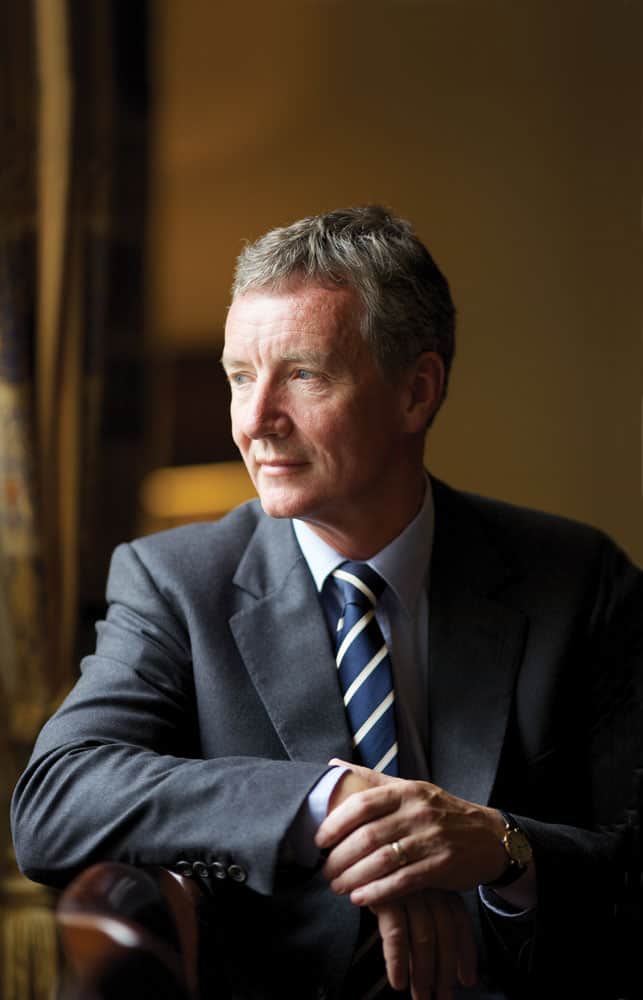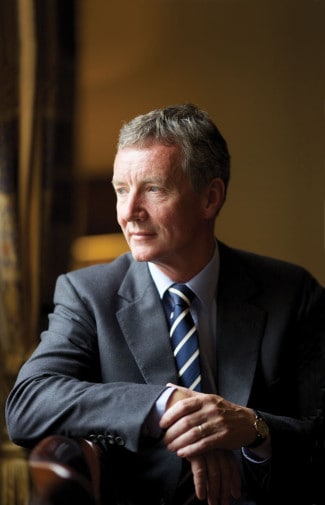Tullow Oil CEO Aidan Heavey talks to John Walsh about the company’s phenomenal success and its future plans.
Tullow Oil was admitted to the FTSE 100 in 2007 with a market capitalisation of £4.5bn and a share price of £5.60. Today its market cap is £9.6bn and its shares are hovering around £11. There aren’t too many other companies in the illustrious index that could boast a similar performance over the same timeframe.
When it came on the radar of energy analysts in the early noughties, the consensus was that it didn’t have a good record of creating value for its shareholders. Tullow has certainly confounded its critics. In terms of total shareholder return growth, Tullow outperformed the FTSE 100 by 750% in the five years between 2005/09. Moreover, Tullow Oil’s chief executive Aidan Heavey says that the company could double in value over the next three years. If his forecast turns out to be accurate, then Tullow will surely go down as one of the best corporate performers in any OECD country in what has been a period of unprecedented economic turmoil.
Not that the company is an overnight success. It was formed in 1985 and its ascent has been achieved on the back of a series of astute moves. Probably none more so than its move into Africa. A number of discoveries over the past few years off the continent’s west coast has elevated the company from scavenger status to the biggest oil independent outside the US.
The Jubilee field off the coast of Ghana has potential reserves of 1 billion barrels of oil equivalent (bn boe). Heavey describes it as a “world-class reservoir”. First oil is forecast to flow from the well in November of this year at a rate of 120,000 boe/d. Tullow has a 34% stake in this field. Given that the company has a current production rate of 55,000 boe/d, a simple calculation shows that Jubilee will come close to doubling Tullow’s overall production.
But Tullow is not a company that can be judged on how many barrels of oil it is producing on a daily basis. After all, this is a company with a market cap of £9.6bn even though it posted a post-tax profit of £18.5m for the financial year 2009. These sort of multiples have not been seen since the height of the dotcom boom.
Its model is discovering oil. In many ways, the oil industry shares many characteristics with the pharmaceutical sector. Big pharma companies have had a dearth of big blockbuster drugs over the past decade which has put huge constraints on growth potential. Smaller life-science companies have filled that void by developing and patenting more customised products.
The big oil companies such as Shell, BP and Exxon have had a relatively dry run since the late 1990s. One of the most important metrics for judging any company is how good it is at replacing its reserves. In other words, is it discovering more oil than it is producing? This is known as its reserve replacement ratio. The big oil companies have had dwindling success in coming up with new oil reserves and have RRRs of below 100%. Tullow, on the other hand, had a reserve replacement ratio of 437% in 2009 which was coming off the back of a dizzying 1,232% in 2008.
And that could get much better if its exploration acreage in Africa shows up the potential that Heavey expects. “It is not just about the Jubilee field, there is a huge amount of development around it that is quite low risk.”
Tullow has an 800km block stretching along the west coast of Africa from Sierra Leone, Liberia, Ivory Coast and Ghana. There is another field close to Jubilee called Tweneboa which has an upside potential reserve estimate of 1.4 billion boe. Tullow has a 49% stake in this field.
“The recovery rates in Tweneboa could be the same as Jubilee. Also, the whole development becomes cheaper because there is a capital-producing facility. You are reducing operating costs all the time. Obviously what we are looking for is oil and I think there is great potential here. I think we could get six or seven prospects all with potential reserves the same size as Jubilee,” said Heavey.
Tullow’s exploration programme for its West African acreage is scheduled to be completed over the next two-to-three years.
The company is part of a three way partnership with the French firm Total and the Chinese National Offshore Oil Corporation (CNOOC) in a project in Uganda, which Heavey describes as potentially being quite significant. Details are expected over the next couple of months.
Tullow has assets in French Guiana, Guyana and Suriname which, Heavey says, has the same geology as its west-African acreage and has the potential to be equally lucrative. That will, in turn, force a change of management focus. “What will happen over the next few years is that more and more scavenger assets will be sold and we will focus on the high value/high-returns fields,” he says.
Oil price uncertainty?
The future of oil prices is going to have huge implications for the global economy and the future of the oil sector itself. If oil prices inflate to levels that put a brake on economic growth, then that will accelerate the move towards alternative energy. But one thing is for sure: this is an era of structurally higher oil prices. How higher remains to be seen. During the worst economic downturn since the 1930s, oil prices barely breached the sub-$60/bl level. “I still think it will rise quite dramatically because we have a problem getting access to oil and the costs are not getting cheaper. It will stay for a few years around $80/bl and then climb to $100/bl and stay there,” says Heavey.
Another criticism that has been directed at Tullow in the past is that it pursued an erroneous hedging policy that gave away a lot of the upside in a period when oil prices were rocketing. Consequently, the company was putting a ceiling on topline growth when other oil firms were reaping the benefits of ballooning revenues.
Heavey says these charges are ill-informed.”It is nonsense. We are producing from 5% of our resource base so even if we hedged the whole lot of it, we would have only given away a tiny proportion of our upside. We hedged about 40% of our production and we did this to cover capital costs over a period of development. The bulk of the hedging was for a year in advance and about 10% of it past that. We have covenants with our banks and our hedging strategies were directly related to those covenants.” He says that Tullow still exercises a hedging strategy at levels of 40% of production.
Although one of the benefits of the oil price dropping from $140/bl in 2007 to $60/bl in 2009/10 is that the demand for rigs has tailed off significantly. Excess demand over supply for rigs was putting a brake on exploration for much of the past decade. “The recession and cash crunch over the past three years have made rig availability very straightforward. There are rigs available now which makes planning a lot easier. We had to have a separate department for this a few years ago.”
M&A
In the same way that boutique life-sciences companies have become acquisition targets for big pharma companies over the past few years, oil independents with healthy reserves have become targets for the big oil majors. On that basis, Tullow would be one of the more lucrative plays in the markets. Moreover, if Tullow was to cash in, then Heavey would walk away from any deal an extremely wealthy man. Surely the temptation must be to hire an investment bank to seek potential bidders in the not-too-distant future? The CEO says the company is resolutely not for sale, even though a number of approaches have been made.
“The big oil companies would love to have our assets but they know that the best assets would walk out the door after any deal and that is the staff. Our shareholders can sell their stock at any time, but 75% of our shareholders have been with us for the past decade. Why? Because they get better results with Tullow than anywhere else. We have grown substantially over the past three years. We are of a size now that one big find now won’t have the same impact but we can still double in size over the next three years.”
And even though Tullow sizes up potential targets all the time, there are no plans to make any acquisitions, he says.
This interview took place on May 18th in the Royal College of Physicians on Kildare Street just before Heavey addressed shareholders. The atmosphere was relaxed and jovial and in sharp contrast to the atmosphere at the following day’s EGM of Bank of Ireland. Tullow is now an international company with Irish roots. There is a lesson in there for both corporate Ireland and the wider economy.
Aidan Heavey: CV
Age: 57
Education: Clongowes Wood College, Co. Kildare; degree in commerce from University College Dublin.
Career:
1978: qualified as an associated chartered accountant.
1974-79: auditor at RJ Kidney & Co.
1979-81: financial controller at Aer Lingus.
1981-84: financial controller at Tullow Engineering.
1985: founded Tullow Oil.
Ireland
‘We will recover having learnt our lesson’
I think we are too hard on ourselves. The Irish are natural business people. They are good at business – natural entrepreneurs – much moreso than any other race. But we ran away with ourselves. We tend to work on extremes.”
He says that during the Celtic Tiger years, it became a fundamental heresy to suggest that the good times were not here to stay. Now a person is accused of being a pollyanna for having the temerity to suggest that the economy may someday recover.
He criticises corporate Ireland for selecting directors from too small a gene pool. “If you look at business here, the management teams are from the same gene pool. They tend to be friends and relatives etc. That has to stop.”
He was awarded the UCD Business Alumni of the Year on April 23rd. He says on the night two ‘exceptional’ students were among his fellow award recipients. “We owe those kids a future. We have a responsibility to those kids. It is time we stopped looking back with the Moriarty Tribunal and all the enquiries. We have to start getting on with it. We need to encourage businesses to go out and invest, not speculate. Speculation destroys wealth.
“I think Ireland will absolutely come out of this in better shape than ever, once we learn the lessons about greed and speculation. The moral is you have to work. I think we will learn that and I think we will boom.”


